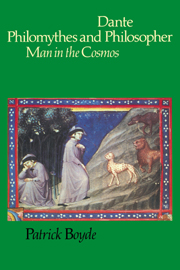Summary
i have come to think of this book simply asDante Philomythes (which I pronounce so that it scans like Samson Agonistes and rhymes with Shanty Bill o' High Seas). Some of my friends found the projected title ‘intriguing’; others thought it might be ‘daunting’; and all of them were a little perplexed. So I decided to begin this preface with a brief explanation of my choice.
‘Philomythes’ has yet to appear in any dictionary of the English language. It is in fact the medieval Latin transliteration of a late Greek form that had grown up alongside the classical philomythos; and I prefer its full and virile sound to that of any of its potential rivals such as ‘philomyth’, ‘philomyther’ or ‘mythophile’.
The meaning of the word will be readily divined from its roots. Just as the philo-soph-os was a lover of true knowledge, so the humbler philomyth-os was a lover of myth, or a lover of the old stories and legends, or, as we might say today, a lover of fiction. It is not difficult, either, to see how these two terms might have been paired and contrasted in earlier debates about the Two Cultures. But my title is to be understood as a specific allusion to the opening chapters of the Metaphysics where Aristotle attempted some kind of reconciliation between them. ‘The lover of myth’, he wrote, ‘is in some sense a lover of true knowledge, because a myth is composed of wonders.’
- Type
- Chapter
- Information
- Dante Philomythes and PhilosopherMan in the Cosmos, pp. vi - viiiPublisher: Cambridge University PressPrint publication year: 1981



